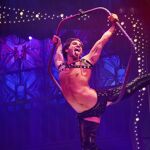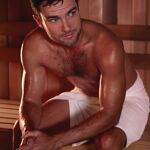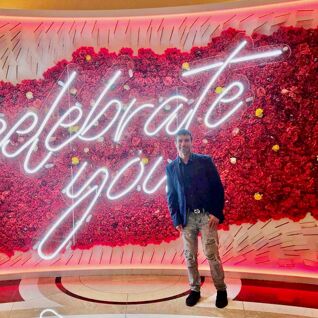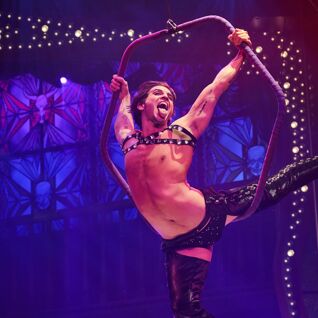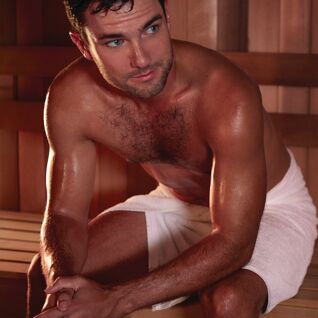
Unquestionably queer and by no means a Sphere, Las Vegas’ newest immersive entertainment experience is rooted in a cube.
The centerpiece of DISCOSHOW, the beat-crazy, body-rocking, boldly subversive hybrid of theater and nightclub that premiered on Saturday, September 7, is a cubic performance space with no seating at 3535 Las Vegas Boulevard, adjacent to the Linq Hotel and Casino.
While state-of-the-art audiovisual technology is employed here, as it is at the Sphere, less than a mile away, the heart of DISCOSHOW is communal human energy. Attendees are exhorted to dance throughout the entire 70-minute performance.
Pack your bags, we’re going on an adventure
Subscribe to our weekly newsletter for the best LGBTQ+ travel guides, stories, and more.
Unlike any other Las Vegas production, DISCOSHOW’s ultimate success hinges on uninhibited audience participation.
Spectacularly inclusive

The performance venue reinvents Saturday Night Fever’s illuminated dance floor by multiplying it fivefold, sending it blazing up the walls, and transforming its simple blinking grid into an infinitely shifting array of high resolution images and abstractions.
The visuals are synced with a richly mixed playlist of throbbing genre classics, including “Knock on Wood” by Amii Steward, “Relight My Fire” by Dan Hartman, and, pointedly, “I Will Survive” by Gloria Gaynor.
The overall effect is eye-popping, sonic, and somatic, making audience members feel like they’re not merely moving to music but within it.
The staged performance, featuring a cast of 17 who move amidst the crowd on the floor, atop rolling platform modules, and on a catwalk that traces the room’s perimeter, also revolts against the Travolta-era mythology of disco as straight, white date-night recreation.
“The story we’re telling is how disco began with outsiders,” said the show’s writer Michael Wynne, a queer man, in an opening night interview with GayCities, explaining that the show was inspired by the New York loft parties that gay DJ David Mancuso threw every week beginning in 1971.
“It was gays, Blacks, Latinos, and single women on the pill going out with their girlfriends,” said Wynne. “There was a political undercurrent to the original 1970s disco scene, a demand for individual liberties. It was just becoming legal for two men even to dance together.”
The majority of DISCOSHOW’s cast members are people of color; its mother-figure emcee is played by a commanding Eureka O’Hara, of “RuPaul’s Drag Race” fame, and its loose narrative, expressed primarily through movement rather than dialogue; concludes with newly liberated queer characters coupling up.
A powerful ally

Wynne and the show’s acclaimed director/choreographer Steven Hoggett (Harry Potter and the Cursed Child; Green Day’s American Idiot), both Brits, are longtime attendees of the Sunday night Horse Meat Disco parties at the London Eagle.
But it was a straight disco afficionado, the show’s lead producer, Ross Mollison, who recruited them to work on the DISCOSHOW project nearly a decade ago.
Mollison, 62, a Barnumesque impresario, began his career in Australia and first broke into the American market producing surprisingly successful early aughts tours of The Puppetry of the Penis (Two men doing foreskin origami as performance art).
In 2006, under the banner of Spiegelworld Productions, he opened Absinthe, a circus-meets-burlesque variety show in a tent on Pier 17 at New York’s South Street Seaport. Five years later, Absinthe moved to Caesars Palace in Las Vegas, where what was initially planned as a 6-month run is now in its 23rd year, playing 12 performances a week.
Related:
In 2016, Las Vegas Weekly rated Absinthe #1 in its list of the 20 greatest Vegas shows of all time, topping five Cirque du Soleil productions as well as Siegfried and Roy.
Uniquely skilled at developing work with a striking balance of the clever and the carnal, Mollison eventually made a deal to create additional productions for Caesars Holding Company, which invested $75 million in Spiegelworld. (Atomic Saloon, in residence at The Venetian, is both the raunchiest and most uproariously funny show in Vegas.)
Since their college years, Mollison and his best friend Andrew Dunn, a gay man and Spiegelworld’s creative director, had loved disco music and aspired to build a production around it.
DISCOWORLD’s long hustle toward fruition has included a short-lived partnership with famed record producer Nile Rogers and the workshop production at La MaMa, New York’s experimental theater incubator that brought Wynne and Hoggett into the fold.
“It’s because Ross is so well respected that we were able to have the kind of creative independence we had in building this show,” said Wynne. “I mean here we are in Las Vegas of all places, and I totally believe in the value of entertainment, but we’ve made a show here that also manages to say something about acceptance and inclusiveness.”
“During one of the preview performances,” said Wynne, “there was an older gay couple in the audience and at one point in the show, they were both crying and sort of holding each other. I think that’s beautiful.”
Deep cuts

Before a raucous finale celebrating the ongoing influence of disco on contemporary music, DISCOSHOW takes a brief, unexpected dip into sorrow as crackling static fills the room. Eureka addresses images of Disco Demolition Night, the 1979 Chicago rally-turned-riot between games of a White Sox doubleheader during which piles of disco records were exploded to chants of “Disco sucks!” and an air of racist, homophobic backlash against the music’s core fan base.
Though it was not until 1981, two years after the Chicago mayhem, that the first cases of AIDS were identified, DISCOSHOW’s “end of an era” scenario feels rightfully haunted by that history. Eureka’s eulogizing, the darkened room, and a male dancer lying prone atop a platform all vibrate with meaning that transcends the ballpark bro-fest. Plenty of audience members will miss this pointed pathos, but it’s there for those who are open to it, pressing hard against the limits of Las Vegas.

Don't forget to share:


